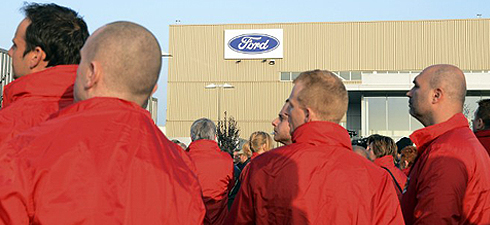The October 24 announcement that Ford’s plant in Genk will down tools in 2014 has provoked a wave of anger in the Flemish press. More than 10,000 jobs in the plant itself and in its sub-contractors will disappear. In Gazet van Antwerpen, columnist Paul Geudens rails againstthe lack of humanity shown by the U.S. automaker —

Coarse. Heartless. Cynical. Cowardly. Boorish. I can find no other words to describe the attitude of Ford’s European management, which did not even have the courage to come and hand down the death sentence itself. An unprecedented insult.
Recalling that just last month the plant was still under contract to build three new models, the columnist encourages unions and the Belgian governments —

... to start legal proceedings [...] A breach of promise must not go unpunished. The tens of millions in subsidies that Ford has gotten should be paid back. They will be put to better use here [in Belgium] for the conversion than in the plants in Spain and Germany.
In De Standaard, chief editor Bart Sturtewagen admits that the way Ford operates is “disgusting”, but calls on the Belgians to “roll up their sleeves” and stop looking for someone to blame —

Are we going to deepen this crisis by indulging in sterile debates that won’t save any money or create any jobs? We’re constantly frittering away our energy by dividing people: employers against employees, bankers against taxpayers, Left against Right [...] Flemish against Walloons [...] Why not use a tenth of this energy on some research targeted at the most promising measures and policy choices that will have the biggest impact on our competitiveness?
Fifteen hundred kilometres away, ABC prints the same photo as the one in Gazet van Antwerpen, but with a rather different caption: “Ford pulls out of Belgium, drawn by the competitiveness of Spain.” The Genk production plant will be relocated to Almusafes in the Valencia region —

The global restructuring designed by Ford strengthens the interests of the Spanish automotive industry [...] For the first time in many months, the South of Europe comes before the North in a decision of great industrial importance.
The American manufacturer's decision will see 10,000 jobs axed in Belgium, but it will ensure the continuity of 15,000 in Spain, ABC notes —

The tears of the Genk workers yesterday were in sharp contrast to the relief felt at the Almusafes plant [...] The nationalist tensions that unsettle Belgium have played their part in shutting down the plant in Genk, whose models will be produced at lower cost in Valencia. [...] Caught up in waves of closures and adjustments, Spain is consolidating its position as the second-largest carmaker in Europe after Germany, a sector that brings in ten percent of the country’s GDP and employs more than 300,000 workers.
Faced with this reversal, La Libre Belgique recalls the closures of the Renault and Vilvoorde plants in 1997 and of the Opel (General Motors) plant in Antwerp in 2010 and asks: “Is there a Belgian disease?”

The closure of the Ford plant in Genk is due to Belgium’s excessively high labour costs (averaging 40.60 euros per hour) [...], which in 2011 held the European Union record, and were twice as high as in Spain (22 euros).
Peter Van Houte, chief economist at ING, notes in an interview with the Belgian newspaper that “to ignore the problem of cost in Belgium would be blindness [...] But to zero in on this cost would be a mistake too.” Issues related to the size of the country, other policy decisions or strategic perspectives” can explain a climate that multinationals find off-putting. The latest report on international competitiveness from the World Bank does not contradict that, and drops Belgium —

... from 20th place in 2008 to 33rd in 2012. In the same time, however, other European countries have moved up the rankings. This is what happened with Spain, which has jumped from 62nd place to 44th.
Was this article useful? If so we are delighted!
It is freely available because we believe that the right to free and independent information is essential for democracy. But this right is not guaranteed forever, and independence comes at a cost. We need your support in order to continue publishing independent, multilingual news for all Europeans.
Discover our subscription offers and their exclusive benefits and become a member of our community now!












